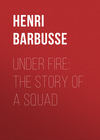Loe raamatut: «Under Fire: The Story of a Squad»
I
The Vision
MONT BLANC, the Dent du Midi, and the Aiguille Verte look across at the bloodless faces that show above the blankets along the gallery of the sanatorium. This roofed-in gallery of rustic wood-work on the first floor of the palatial hospital is isolated in Space and overlooks the world. The blankets of fine wool—red, green, brown, or white—from which those wasted cheeks and shining eyes protrude are quite still. No sound comes from the long couches except when some one coughs, or that of the pages of a book turned over at long and regular intervals, or the undertone of question and quiet answer between neighbors, or now and again the crescendo disturbance of a daring crow, escaped to the balcony from those flocks that seem threaded across the immense transparency like chaplets of black pearls.
Silence is obligatory. Besides, the rich and high-placed who have come here from all the ends of the earth, smitten by the same evil, have lost the habit of talking. They have withdrawn into themselves, to think of their life and of their death.
A servant appears in the balcony, dressed in white and walking softly. She brings newspapers and hands them about.
"It's decided," says the first to unfold his paper. "War is declared."
Expected as the news is, its effect is almost dazing, for this audience feels that its portent is without measure or limit. These men of culture and intelligence, detached from the affairs of the world and almost from the world itself, whose faculties are deepened by suffering and meditation, as far remote from their fellow men as if they were already of the Future—these men look deeply into the distance, towards the unknowable land of the living and the insane.
"Austria's act is a crime," says the Austrian.
"France must win," says the Englishman.
"I hope Germany will be beaten," says the German.
They settle down again under the blankets and on the pillows, looking to heaven and the high peaks. But in spite of that vast purity, the silence is filled with the dire disclosure of a moment before.
War!
Some of the invalids break the silence, and say the word again under their breath, reflecting that this is the greatest happening of the age, and perhaps of all ages. Even on the lucid landscape at which they gaze the news casts something like a vague and somber mirage.
The tranquil expanses of the valley, adorned with soft and smooth pastures and hamlets rosy as the rose, with the sable shadow-stains of the majestic mountains and the black lace and white of pines and eternal snow, become alive with the movements of men, whose multitudes swarm in distinct masses. Attacks develop, wave by wave, across the fields and then stand still. Houses are eviscerated like human beings and towns like houses. Villages appear in crumpled whiteness as though fallen from heaven to earth. The very shape of the plain is changed by the frightful heaps of wounded and slain.
Each country whose frontiers are consumed by carnage is seen tearing from its heart ever more warriors of full blood and force. One's eyes follow the flow of these living tributaries to the River of Death. To north and south and west afar there are battles on every side. Turn where you will, there is war in every corner of that vastness.
One of the pale-faced clairvoyants lifts himself on his elbow, reckons and numbers the fighters present and to come—thirty millions of soldiers. Another stammers, his eyes full of slaughter, "Two armies at death-grips—that is one great army committing suicide."
"It should not have been," says the deep and hollow voice of the first in the line. But another says, "It is the French Revolution beginning again." "Let thrones beware!" says another's undertone.
The third adds, "Perhaps it is the last war of all." A silence follows, then some heads are shaken in dissent whose faces have been blanched anew by the stale tragedy of sleepless night—"Stop war? Stop war? Impossible! There is no cure for the world's disease."
Some one coughs, and then the Vision is swallowed up in the huge sunlit peace of the lush meadows. In the rich colors of the glowing kine, the black forests, the green fields and the blue distance, dies the reflection of the fire where the old world burns and breaks. Infinite silence engulfs the uproar of hate and pain from the dark swarmings of mankind. They who have spoken retire one by one within themselves, absorbed once more in their own mysterious malady.
But when evening is ready to descend within the valley, a storm breaks over the mass of Mont Blanc. One may not go forth in such peril, for the last waves of the storm-wind roll even to the great veranda, to that harbor where they have taken refuge; and these victims of a great internal wound encompass with their gaze the elemental convulsion.
They watch how the explosions of thunder on the mountain upheave the level clouds like a stormy sea, how each one hurls a shaft of fire and a column of cloud together into the twilight; and they turn their wan and sunken faces to follow the flight of the eagles that wheel in the sky and look from their supreme height down through the wreathing mists, down to earth.
"Put an end to war?" say the watchers.—"Forbid the Storm!"
Cleansed from the passions of party and faction, liberated from prejudice and infatuation and the tyranny of tradition, these watchers on the threshold of another world are vaguely conscious of the simplicity of the present and the yawning possibilities of the future.
The man at the end of the rank cries, "I can see crawling things down there"—"Yes, as though they were alive"—"Some sort of plant, perhaps"—"Some kind of men"—
And there amid the baleful glimmers of the storm, below the dark disorder of the clouds that extend and unfurl over the earth like evil spirits, they seem to see a great livid plain unrolled, which to their seeing is made of mud and water, while figures appear and fast fix themselves to the surface of it, all blinded and borne down with filth, like the dreadful castaways of shipwreck. And it seems to them that these are soldiers.
The streaming plain, seamed and seared with long parallel canals and scooped into water-holes, is an immensity, and these castaways who strive to exhume themselves from it are legion. But the thirty million slaves, hurled upon one another in the mud of war by guilt and error, uplift their human faces and reveal at last a bourgeoning Will. The future is in the hands of these slaves, and it is clearly certain that the alliance to be cemented some day by those whose number and whose misery alike are infinite will transform the old world.
II
In the Earth
THE great pale sky is alive with thunderclaps. Each detonation reveals together a shaft of red falling fire in what is left of the night, and a column of smoke in what has dawned of the day. Up there—so high and so far that they are heard unseen—a flight of dreadful birds goes circling up with strong and palpitating cries to look down upon the earth.
The earth! It is a vast and water-logged desert that begins to take shape under the long-drawn desolation of daybreak. There are pools and gullies where the bitter breath of earliest morning nips the water and sets it a-shiver; tracks traced by the troops and the convoys of the night in these barren fields, the lines of ruts that glisten in the weak light like steel rails, mud-masses with broken stakes protruding from them, ruined trestles, and bushes of wire in tangled coils. With its slime-beds and puddles, the plain might be an endless gray sheet that floats on the sea and has here and there gone under. Though no rain is falling, all is drenched, oozing, washed out and drowned, and even the wan light seems to flow.
Now you can make out a network of long ditches where the lave of the night still lingers. It is the trench. It is carpeted at bottom with a layer of slime that liberates the foot at each step with a sticky sound; and by each dug-out it smells of the night's excretions. The holes themselves, as you stoop to peer in, are foul of breath.
I see shadows coming from these sidelong pits and moving about, huge and misshapen lumps, bear-like, that flounder and growl. They are "us." We are muffled like Eskimos. Fleeces and blankets and sacking wrap us up, weigh us down, magnify us strangely. Some stretch themselves, yawning profoundly. Faces appear, ruddy or leaden, dirt-disfigured, pierced by the little lamps of dull and heavy-lidded eyes, matted with uncut beards and foul with forgotten hair.
Crack! Crack! Boom!—rifle fire and cannonade. Above us and all around, it crackles and rolls, in long gusts or separate explosions. The flaming and melancholy storm never, never ends. For more than fifteen months, for five hundred days in this part of the world where we are, the rifles and the big guns have gone on from morning to night and from night to morning. We are buried deep in an everlasting battlefield; but like the ticking of the clocks at home in the days gone by—in the now almost legendary Past—you only hear the noise when you listen.
A babyish face with puffy eyelids, and cheek-bones as lurid as if lozenge-shaped bits of crimson paper had been stuck on, comes out of the ground, opens one eye, then the other. It is Paradis. The skin of his fat cheeks is scored with the marks of the folds in the tent-cloth that has served him for night-cap. The glance of his little eye wanders all round me; he sees me, nods, and says—"Another night gone, old chap."
"Yes, sonny; how many more like it still?"
He raises his two plump arms skywards. He has managed to scrape out by the steps of the dug-out and is beside me. After stumbling over the dim obstacle of a man who sits in the shadows, fervently scratches himself and sighs hoarsely, Paradis makes off—lamely splashing like a penguin through the flooded picture.
One by one the men appear from the depths. In the corners, heavy shadows are seen forming—human clouds that move and break up. One by one they become recognizable. There is one who comes out hooded with his blanket—a savage, you would say, or rather, the tent of a savage, which walks and sways from side to side. Near by, and heavily framed in knitted wool, a square face is disclosed, yellow-brown as though iodized, and patterned with blackish patches, the nose broken, the eyes of Chinese restriction and red-circled, a little coarse and moist mustache like a greasing-brush.
"There's Volpatte. How goes it, Firmin?"
"It goes, it goes, and it comes," says Volpatte. His heavy and drawling voice is aggravated by hoarseness. He coughs—"My number's up, this time. Say, did you hear it last night, the attack? My boy, talk about a bombardment—something very choice in the way of mixtures!" He sniffles and passes his sleeve under his concave nose. His hand gropes within his greatcoat and his jacket till it finds the skin, and scratches. "I've killed thirty of them in the candle," he growls; "in the big dug-out by the tunnel, mon vieux, there are some like crumbs of metal bread. You can see them running about in the straw like I'm telling you."
"Who's been attacking? The Boches?"
"The Boches and us too—out Vimy way—a counterattack—didn't you hear it?"
"No," the big Lamuse, the ox-man, replies on my account; "I was snoring; but I was on fatigue all night the night before."
"I heard it," declares the little Breton, Biquet; "I slept badly, or rather, didn't sleep. I've got a doss-house all to myself. Look, see, there it is—the damned thing." He points to a trough on the ground level, where on a meager mattress of muck, there is just body-room for one. "Talk about home in a nutshell!" he declares, wagging the rough and rock-hard little head that looks as if it had never been finished. "I hardly snoozed. I'd just got off, but was woke up by the relief of the 129th that went by—not by the noise, but the smell. Ah, all those chaps with their feet on the level with my nose! It woke me up, it gave me nose-ache so."
I knew it. I have often been wakened in the trench myself by the trail of heavy smell in the wake of marching men.
"It was all right, at least, if it killed the vermin," said Tirette.
"On the contrary, it excites them," says Lamuse; "the worse you smell, the more you have of 'em."
"And it's lucky," Biquet went on, "that their stink woke me up. As I was telling that great tub just now, I got my peepers open just in time to seize the tent-cloth that shut my hole up—one of those muck-heaps was going to pinch it off me."
"Dirty devils, the 129th." The human form from which the words came could now be distinguished down below at our feet, where the morning had not yet reached it. Grasping his abundant clothing by handsful, he squatted and wriggled. It was Papa Blaire. His little eyes blinked among the dust that luxuriated on his face. Above the gap of his toothless mouth, his mustache made a heavy sallow lump. His hands were horribly black, the top of them shaggy with dirt, the palms plastered in gray relief. Himself, shriveled and dirtbedight, exhaled the scent of an ancient stewpan. Though busily scratching, he chatted with big Barque, who leaned towards him from a little way off.
"I wasn't as mucky as this when I was a civvy," he said.
"Well, my poor friend, it's a dirty change for the worse," said Barque.
"Lucky for you," says Tirette, going one better; "when it comes to kids, you'll present madame with some little niggers!"
Blaire took offense, and gathering gloom wrinkled his brow. "What have you got to give me lip about, you? What next? It's war-time. As for you, bean-face, you think perhaps the war hasn't changed your phizog and your manners? Look at yourself, monkey-snout, buttock-skin! A man must be a beast to talk as you do." He passed his hand over the dark deposit on his face, which the rains of those days had proved finally indelible, and added, "Besides, if I am as I am, it's my own choosing. To begin with, I have no teeth. The major said to me a long time ago, 'You haven't a single tooth. It's not enough. At your next rest,' he says, 'take a turn round to the estomalogical ambulance.'"
"The tomatological ambulance," corrected Barque.
"Stomatological," Bertrand amended.
"You have all the making of an army cook—you ought to have been one," said Barque.
"My idea, too," retorted Blaire innocently. Some one laughed. The black man got up at the insult. "You give me belly-ache," he said with scorn. "I'm off to the latrines."
When his doubly dark silhouette had vanished, the others scrutinized once more the great truth that down here in the earth the cooks are the dirtiest of men.
"If you see a chap with his skin and toggery so smeared and stained that you wouldn't touch him with a barge-pole, you can say to yourself, 'Probably he's a cook.' And the dirtier he is, the more likely to be a cook."
"It's true, and true again," said Marthereau.
"Tiens, there's Tirloir! Hey, Tirloir!"
He comes up busily, peering this way and that, on an eager scent. His insignificant head, pale as chlorine, hops centrally about in the cushioning collar of a greatcoat that is much too heavy and big for him. His chin is pointed, and his upper teeth protrude. A wrinkle round his mouth is so deep with dirt that it looks like a muzzle. As usual, he is angry, and as usual, he rages aloud.
"Some one cut my pouch in two last night!"
"It was the relief of the 129th. Where had you put it?"
He indicates a bayonet stuck in the wall of the trench close to the mouth of a funk-hole—"There, hanging on the toothpick there."
"Ass!" comes the chorus. "Within reach of passing soldiers! Not dotty, are you?"
"It's hard lines all the same," wails Tirloir. Then suddenly a fit of rage seizes him, his face crumples, his little fists clench in fury, he tightens them like knots in string and waves them about. "Alors quoi? Ah, if I had hold of the mongrel that did it! Talk about breaking his jaw—I'd stave in his bread-pan, I'd—there was a whole Camembert in there, I'll go and look for it." He massages his stomach with the little sharp taps of a guitar player, and plunges into the gray of the morning, grinning yet dignified, with his awkward outlines of an invalid in a dressing-gown. We hear him grumbling until he disappears.
"Strange man, that," says Pepin; the others chuckle. "He's daft and crazy," declares Marthereau, who is in the habit of fortifying the expression of his thought by using two synonyms at once.
"Tiens, old man," says Tulacque, as he comes up. "Look at this."
Tulacque is magnificent. He is wearing a lemon-yellow coat made out of an oilskin sleeping-sack. He has arranged a hole in the middle to get his head through, and compelled his shoulder-straps and belt to go over it. He is tall and bony. He holds his face in advance as he walks, a forceful face, with eyes that squint. He has something in his hand. "I found this while digging last night at the end of the new gallery to change the rotten gratings. It took my fancy off-hand, that knick-knack. It's an old pattern of hatchet."
It was indeed an old pattern, a sharpened flint hafted with an old brown bone—quite a prehistoric tool in appearance.
"Very handy," said Tulacque, fingering it. "Yes, not badly thought out. Better balanced than the regulation ax. That'll be useful to me, you'll see." As he brandishes that ax of Post-Tertiary Man, he would himself pass for an ape-man, decked out with rags and lurking in the bowels of the earth.
One by one we gathered, we of Bertrand's squad and the half-section, at an elbow of the trench. Just here it is a little wider than in the straight part where when you meet another and have to pass you must throw yourself against the side, rub your back in the earth and your stomach against the stomach of the other.
Our company occupies, in reserve, a second line parallel. No night watchman works here. At night we are ready for making earthworks in front, but as long as the day lasts we have nothing to do. Huddled up together and linked arm in arm, it only remains to await the evening as best we can.
Daylight has at last crept into the interminable crevices that furrow this part of the earth, and now it finds the threshold of our holes. It is the melancholy light of the North Country, of a restricted and muddy sky, a sky which itself, one would say, is heavy with the smoke and smell of factories. In this leaden light, the uncouth array of these dwellers in the depths reveals the stark reality of the huge and hopeless misery that brought it into being. But that is like the rattle of rifles and the verberation of artillery. The drama in which we are actors has lasted much too long for us to be surprised any more, either at the stubbornness we have evolved or the garb we have devised against the rain that comes from above, against the mud that comes from beneath, and against the cold—that sort of infinity that is everywhere. The skins of animals, bundles of blankets, Balaklava helmets, woolen caps, furs, bulging mufflers (sometimes worn turban-wise), paddings and quiltings, knittings and double-knittings, coverings and roofings and cowls, tarred or oiled or rubbered, black or all the colors (once upon a time) of the rainbow—all these things mask and magnify the men, and wipe out their uniforms almost as effectively as their skins. One has fastened on his back a square of linoleum, with a big draught-board pattern in white and red, that he found in the middle of the dining-room of some temporary refuge. That is Pepin. We know him afar off by his harlequin placard sooner even than by his pale Apache face. Here is Barque's bulging chest-protector, carven from an eiderdown quilt, formerly pink, but now fantastically bleached and mottled by dust and rain. There, Lamuse the Huge rises like a ruined tower to which tattered posters still cling. A cuirass of moleskin, with the fur inside, adorns little Eudore with the burnished back of a beetle; while the golden corselet of Tulacque the Big Chief surpasses all.
The "tin hat" gives a certain sameness to the highest points of the beings that are there, but even then the divers ways of wearing it—on the regulation cap like Biquet, over a Balaklava like Cadilhac, or on a cotton cap like Barque—produce a complicated diversity of appearance.
And our legs! I went down just now, bent double, into our dug-out, the little low cave that smells musty and damp, where one stumbles over empty jam-pots and dirty rags, where two long lumps lay asleep, while in the corner a kneeling shape rummaged a pouch by candle-light. As I climbed out, the rectangle of entry afforded me a revelation of our legs. Flat on the ground, vertically in the air, or aslant; spread about, doubled up, or mixed together; blocking the fairway and cursed by passers-by, they present a collection of many colors and many shapes—gaiters, leggings black or yellow, long or short, in leather, in tawny cloth, in any sort of waterproof stuff; puttees in dark blue, light blue, black, sage green, khaki, and beige. Alone of all his kind, Volpatte has retained the modest gaiters of mobilization. Mesnil Andre has displayed for a fortnight a pair of thick woolen stockings, ribbed and green; and Tirette has always been known by his gray cloth puttees with white stripes, commandeered from a pair of civilian trousers that was hanging goodness knows where at the beginning of the war. As for Marthereau's puttees, they are not both of the same hue, for he failed to find two fag-ends of greatcoat equally worn and equally dirty, to be cut up into strips.
There are legs wrapped up in rags, too, and even in newspapers, which are kept in place with spirals of thread or—much more practical—telephone wire. Pepin fascinated his friends and the passers-by with a pair of fawn gaiters, borrowed from a corpse. Barque, who poses as a resourceful man, full of ideas—and Heaven knows what a bore it makes of him at times!—has white calves, for he wrapped surgical bandages round his leg-cloths to preserve them, a snowy souvenir at his latter end of the cotton cap at the other, which protrudes below his helmet and is left behind in its turn by a saucy red tassel. Poterloo has been walking about for a month in the boots of a German soldier, nearly new, and with horseshoes on the heels. Caron entrusted them to Poterloo when he was sent back on account of his arm. Caron had taken them himself from a Bavarian machine-gunner, knocked out near the Pylones road. I can hear Caron telling about it yet—
"Old man, he was there, his buttocks in a hole, doubled up, gaping at the sky with his legs in the air, and his pumps offered themselves to me with an air that meant they were worth my while. 'A tight fit,' says I. But you talk about a job to bring those beetle-crushers of his away! I worked on top of him, tugging, twisting and shaking, for half an hour and no lie about it. With his feet gone quite stiff, the patient didn't help me a bit. Then at last the legs of it—they'd been pulled about so—came unstuck at the knees, and his breeks tore away, and all the lot came, flop! There was me, all of a sudden, with a full boot in each fist. The legs and feet had to be emptied out."
"You're going it a bit strong!"
"Ask Euterpe the cyclist if it isn't true. I tell you he did it along of me, too. We shoved our arms inside the boots and pulled out of 'em some bones and bits of sock and bits of feet. But look if they weren't worth while!"
So, until Caron returns, Poterloo continues on his behalf the wearing of the Bavarian machine-gunner's boots.
Thus do they exercise their wits, according to their intelligence, their vivacity, their resources, and their boldness, in the struggle with the terrible discomfort. Each one seems to make the revealing declaration, "This is all that I knew, all I was able, all that I dared to do in the great misery which has befallen me."
Mesnil Joseph drowses; Blaire yawns; Marthereau smokes, "eyes front." Lamuse scratches himself like a gorilla, and Eudore like a marmoset. Volpatte coughs, and says, "I'm kicking the bucket." Mesnil Andre has got out his mirror and comb and is tending his fine chestnut beard as though it were a rare plant. The monotonous calm is disturbed here and there by the outbreaks of ferocious resentment provoked by the presence of parasites—endemic, chronic, and contagious.
Barque, who is an observant man, sends an itinerant glance around, takes his pipe from his mouth, spits, winks, and says—"I say, we don't resemble each other much."
"Why should we?" says Lamuse. "It would be a miracle if we did."
Our ages? We are of all ages. Ours is a regiment in reserve which successive reinforcements have renewed partly with fighting units and partly with Territorials. In our half-section there are reservists of the Territorial Army, new recruits, and demi-poils. Fouillade is forty; Blaire might be the father of Biquet, who is a gosling of Class 1913. The corporal calls Marthereau "Grandpa" or "Old Rubbish-heap," according as in jest or in earnest. Mesnil Joseph would be at the barracks if there were no war. It is a comical effect when we are in charge of Sergeant Vigile, a nice little boy, with a dab on his lip by way of mustache. When we were in quarters the other day, he played at skipping-rope with the kiddies. In our ill-assorted flock, in this family without kindred, this home without a hearth at which we gather, there are three generations side by side, living, waiting, standing still, like unfinished statues, like posts.
Our races? We are of all races; we come from everywhere. I look at the two men beside me. Poterloo, the miner from the Calonne pit, is pink; his eyebrows are the color of straw, his eyes flax-blue. His great golden head involved a long search in the stores to find the vast steel-blue tureen that bonnets him. Fouillade, the boatman from Cette, rolls his wicked eyes in the long, lean face of a musketeer, with sunken cheeks and his skin the color of a violin. In good sooth, my two neighbors are as unlike as day and night.
Cocon, no less, a slight and desiccated person in spectacles, whose tint tells of corrosion in the chemical vapors of great towns, contrasts with Biquet, a Breton in the rough, whose skin is gray and his jaw like a paving-stone; and Mesnil Andre, the comfortable chemist from a country town in Normandy, who has such a handsome and silky beard and who talks so much and so well—he has little in common with Lamuse, the fat peasant of Poitou, whose cheeks and neck are like underdone beef. The suburban accent of Barque, whose long legs have scoured the streets of Paris in all directions, alternates with the semi-Belgian cadence of those Northerners who came from the 8th Territorial; with the sonorous speech, rolling on the syllables as if over cobblestone, that the 144th pours out upon us; with the dialect blown from those ant-like clusters that the Auvergnats so obstinately form among the rest. I remember the first words of that wag, Tirette, when he arrived—"I, mes enfants, I am from Clichy-la-Garenne! Can any one beat that?"—and the first grievance that Paradis brought to me, "They don't give a damn for me, because I'm from Morvan!"
Our callings? A little of all—in the lump. In those departed days when we had a social status, before we came to immure our destiny in the molehills that we must always build up again as fast as rain and scrap-iron beat them down, what were we? Sons of the soil and artisans mostly. Lamuse was a farm-servant, Paradis a carter. Cadilhac, whose helmet rides loosely on his pointed head, though it is a juvenile size—like a dome on a steeple, says Tirette—owns land. Papa Blaire was a small farmer in La Brie. Barque, porter and messenger, performed acrobatic tricks with his carrier-tricycle among the trains and taxis of Paris, with solemn abuse (so they say) for the pedestrians, fleeing like bewildered hens across the big streets and squares. Corporal Bertrand, who keeps himself always a little aloof, correct, erect, and silent, with a strong and handsome face and forthright gaze, was foreman in a case-factory. Tirloir daubed carts with paint—and without grumbling, they say. Tulacque was barman at the Throne Tavern in the suburbs; and Eudore of the pale and pleasant face kept a roadside cafe not very far from the front lines. It has been ill-used by the shells—naturally, for we all know that Eudore has no luck. Mesnil Andre, who still retains a trace of well-kept distinction, sold bicarbonate and infallible remedies at his pharmacy in a Grande Place. His brother Joseph was selling papers and illustrated story-books in a station on the State Railways at the same time that, in far-off Lyons, Cocon, the man of spectacles and statistics, dressed in a black smock, busied himself behind the counters of an ironmongery, his hands glittering with plumbago; while the lamps of Becuwe Adolphe and Poterloo, risen with the dawn, trailed about the coalpits of the North like weakling Will-o'-th'-wisps.
And there are others amongst us whose occupations one can never recall, whom one confuses with one another; and the rural nondescripts who peddled ten trades at once in their packs, without counting the dubious Pepin, who can have had none at all. (While at the depot after sick leave, three months ago, they say, he got married—to secure the separation allowance.)
The liberal professions are not represented among those around me. Some teachers are subalterns in the company or Red Cross men. In the regiment a Marist Brother is sergeant in the Service de Sante; a professional tenor is cyclist dispatch-rider to the Major; a "gentleman of independent means" is mess corporal to the C.H.R. But here there is nothing of all that. We are fighting men, we others, and we include hardly any intellectuals, or men of the arts or of wealth, who during this war will have risked their faces only at the loopholes, unless in passing by, or under gold-laced caps.
Yes, we are truly and deeply different from each other. But we are alike all the same. In spite of this diversity of age, of country, of education, of position, of everything possible, in spite of the former gulfs that kept us apart, we are in the main alike. Under the same uncouth outlines we conceal and reveal the same ways and habits, the same simple nature of men who have reverted to the state primeval.




















